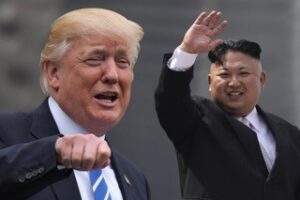
~ ~ ~
The Singapore Summit has left me with three major conclusions.
First and foremost, Trump showed himself to be a lousy negotiator. Somebody once observed that if you really want a deal badly, you get a really bad deal. And so it has been with President Trump and his handling of North Korea.
The key part of the bilateral deal that emerged from the Summit was a reiteration of the vague North Korean promise to denuclearize in return for Trump’s promise to end U.S. military exercises with its South Korean allies.
This is a serious concession. Allies who do not exercise on an ongoing basis are allies who are not confident about their ability to function effectively together, if push comes to shove. South Korea and also Japan will have been questioning the credibility of the U.S. security guarantee well before the Singapore Summit. Now, however, they will feel their backs up against a wall.
Second, Xi-Jinping and Vladimir Putin can congratulate themselves on a job well done. My assumption is that these two strategic partners have been working together since 2012 to create a seemingly credible North Korean nuclear missile threat that would draw the Americans to the negotiating table in an effort to neutralize it.
Except that there never was, nor is there now, a credible North Korean threat to the United States. Assuming that a North Korean missile could reach a U.S. target, we can be almost 100% certain that this would lead to a retaliatory U.S. strike doing serious if not existential damage to North Korea, including its leadership. At the same time, an American first strike is similarly improbable as this would put at risk the 200,000 or so Americans residing in South Korea from a retaliatory North Korean strike. Bottom line: there has been virtually no danger of a cataclysmic conflict between North Korea and the United States. Still, North Korea’s benefactors have been able to create the opposite impression and now they are reaping the benefits.
So, President Trump has been drawn into a negotiation of a problem that is not a problem. What is more, in the process he has shown that he is prepared to settle for terms that are not in the interests of the United States, not to mention its allies.
For example, in the lead-up to the Summit, Trump dropped punitive treatment against a Chinese firm active in the U.S. market that had been caught breaking sanctions imposed against Iran. Then, when the new building housing America’s diplomatic presence in Taiwan was recently inaugurated, Washington sent only a low-level official to avoid the wrath of Beijing. (The Chinese leadership maintains that the island is its property irrespective of its history and the opinion of the vast majority of the Taiwanese population.)
The collateral damage stemming from Trump’s desire to get a deal has not only been felt in East Asia. At the G7, held in Quebec just a few days before the Singapore Summit, Trump arrived late, refused to sign on to a closing communiqué that inter alia called for respect of the rules-based international order, left early, and last but not least, at a closing press conference accused his host, Canadian Prime Minister Trudeau, of being weak, dishonest and meek. A Trump aid then assailed Trudeau for ostensibly stabbing Trump in the back for repeating Canadian concerns about the tariffs placed on Canadian exports to the U.S., claiming that there was a place in hell for Trudeau, a statement for which he has since apologized.
My take is that this was mainly about Trump putting on display his capacity to disrupt the international order that has prevailed since the Second World War in an effort to endear himself to those calling the shots on North Korea.
My third takeaway is that the pattern exhibited at and around the Singapore Summit is likely to continue with increasingly adverse repercussions for international peace and security. Beijing and Moscow have seen that Trump is desperate for foreign policy victories. They can continue to hold out that prospect while delivering relatively little in return. Pyongyang is fully on board, inter alia, because this can extend the shelf life of an almost seventy-year old regime whose use before date would have long expired without the military build-up that Putin and Xi-Jinping have put into play.
The United States’ traditional allies have to rethink their geostrategic options – comprehensively and quickly.
~~~
David M. Law
http://www.davidmlaw.com/home/
(Photo credit, Trump, above – MANDEL NGAN/AFP/Getty Images)